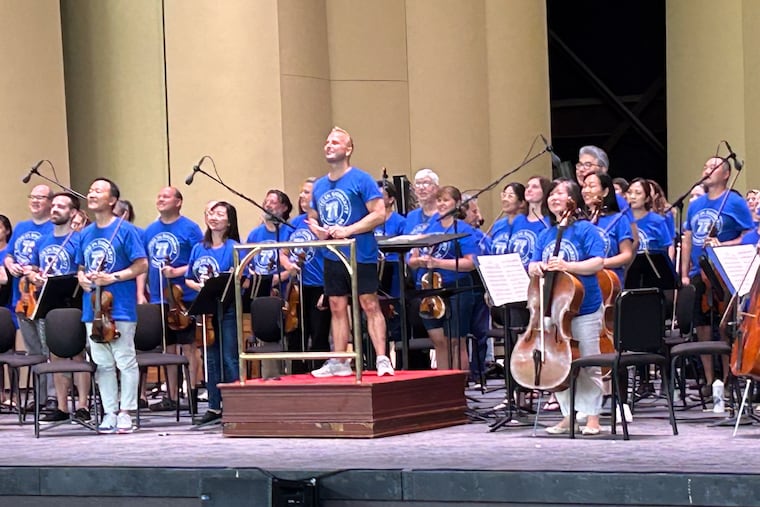Philadelphia Orchestra musicians approve a new labor agreement for higher pay, increased work protections
The new contract comes after several weeks of the threat of a strike and months of tension.

More than a month after their last contract expired and over two months after a strike authorization vote, the union musicians of the Philadelphia Orchestra finally approved a new contract Saturday night.
The players ratified an agreement with their Philadelphia Orchestra-Kimmel Center (POKC) Inc. bosses that addresses many of the American Federation of Musicians Local 77′s chief demands.
“We are an ensemble, and we stuck together and refused to accept substandard deal after substandard deal. This contract is a victory for the present and future for the Philadelphia Orchestra and its world-class musicians,” said David Fay, who plays double bass and is chair of the orchestra’s Members Committee.
“It includes the largest base salary increase that we have seen in recent memory, necessary improvements to work rules, and pay parity for the substitute and extra musicians that work tirelessly to preserve the sound of our ensemble.”
Fay also expressed the orchestra members’ appreciation of musical and artistic director Yannick Nézet-Séguin “whose deep respect for us as musicians was evident in his support for a fair contract.”
Under the contract, the musicians will get a 15.8% compounded base salary increase over three years — with 6% in the first year.
That isn’t the 19.6% increase the musicians’ legal counsel had said they would need to bring their base salary up to the average of the nation’s other top orchestras. However, it is a jump from the 13% increase and more recent 13.5% increase over three years that managers had been offering.
In addition to the base salary increase, by year three of the agreement, the new contract will raise the pay for orchestra substitutes and extra musicians to 100% of what full-time players earn. The freelancers will also receive full payment if their services are canceled with fewer than two weeks’ notice.
The agreement also requires POKC to increase the number of musicians it hires to bring the orchestra up to its full complement of 105 musicians, along with two librarians. There are other work-rule improvements and protections as well.
The resolution was welcomed by both sides.
“Through this first post-pandemic-era contract, negotiated in a complex context, we continue to demonstrate that a focus on common goals and the greatness of the ensemble is always the path forward,” Matías Tarnopolsky, POKC president and CEO, said in a statement.
“My deep thanks and appreciation to the musicians of the orchestra and the Board of Trustees, and to the administrative team, for bringing this agreement to fruition. Yannick Nézet-Séguin and The Philadelphia Orchestra will continue to envision, create, and perform at the very highest level, leading the rapidly evolving landscape of music worldwide.”
Ellen Trainer, Local 77 president, said improvement is still needed in the musicians’ retirement benefits, and the substitute musicians still will not receive such benefits. But she said headway has been made.
“This contract begins to make the necessary investments in the musicians of the Philadelphia Orchestra in order to preserve its place as one of the world’s best symphony orchestras,” Trainer said. “ I applaud Philadelphia’s courageous musicians, who took a stand throughout this process and refused to work more for less.”
The several-months-long negotiations process was full of tension and at times fraught with emotion. The musicians took a public jab at Tarnopolsky’s salary, and they held a sidewalk demonstration before going on an out-of-state tour “under protest.” They said their compensation levels had fallen and were hindering the orchestra’s ability to attract top talent.
On Sept. 29, the players’ union filed an unfair labor practice charge with the National Labor Relations Board. And both sides pointed to sacrifices they made during the pandemic for the good of the orchestra.
POKC management, meanwhile, contended its offers to the players were strong, but had to be balanced with financial challenges, including a deficit, soft ticket sales, and falling short in their fundraising goals.